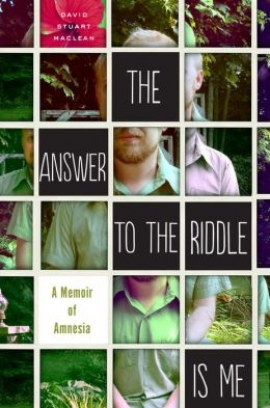Things were going well for Warren Wilson alum David Stuart MacLean: He was working his way through grad school, had a girlfriend who adored him and had landed a Fulbright scholarship that allowed him to live in India for a year. MacLean’s plan was to study how English is spoken by Indians — necessary research for a novel he wanted to write.
The only problem was, MacLean regained consciousness in a train station and couldn’t remember any of it. Not the plot of novel, not his reason for being at the train station, not his girlfriend, not his own name. “I was calm,” he writes in The Answer to the Riddle is Me, which comes out Tuesday, Jan. 14. This passage take place after kind strangers delivered him to an Indian mental hospital. “I was tied down, cloth and leather straps on wrists and ankles, but I was calm. … I said to the doctor, ‘Thank God I took all that acid in college, or I’d be really screwed.’”
Initially convinced that his amnesia was caused by a drug overdose, MacLean eventually learned that it was a reaction to Larium, an antimalarial medication. His first episode of amnesia took place in the fall of 2002 — The Answer to the Riddle is Me is MacLean’s memoir of recovering his memory and rebuilding his life over the next decade.
The discussion notes that come with the review copy of this book point out that “a memoir of amnesia” is a contradiction. In fact, this story could also be classified as an adventure tale: traveling through India, through mental illness and depression, through complicated relationships and through the many phases of identity. In all of that, the author does a great job of balancing difficult subject matter with humor and candor. He’s honest and often funny, but not afraid to discuss suicidal thoughts and some pretty intense demons.
 Image by Heather Eidson Photography
Image by Heather Eidson Photography
He also learns that, prior to amnesia, he was a prankster. A fellow grad school in India admits that he thought MacLean’s hallucinations and hospitalization were a hoax. “‘I thought you were doing research on mental health hospitals.’ He held his hands in the air, blocking out a headline. ‘Indian Psychopaths: An Inside Look. I was very impressed with you.’
“‘When I pissed myself, you dropped the idea right?’
“‘I thought you were very, let us say, committed to your plan,’ Veda said, delighted with his wordplay.”
Other characters drift in and out of the narrative: MacLean’s befuddled love interests, his concerned family and a number of associates in India. The reader gets to discover them, as MacLean does, through the filter of a shattered memory. Even fragmented, each character adds to the story in delightful ways.
The writing style is engaging — short chapters give snapshots of the story and act (perhaps) as an example of the experience of sporadically-recovered memory. MacLean also is skilled at knowing what of the convoluted story to tell and what to leave out. Many memoirs get hung up on telling everything, as it happened, in a linear style. They get bogged down in detail. The Answer to the Riddle is Me is told with a light touch and moves quickly.
There are a few more academic sections on the development and use of the medicine Larium. They’re pretty short, too, and are helpful for making sense of MacLean’s illness. (As a Warren Wilson grad myself, I was prescribed the same medication — by the Buncombe County Health Department — for a trip to India, with the college in the ‘90s. My only negative side effects were headaches.) Nearly five years after his last dose of Larium, MacLean suffered seizures. He notes, near the end of the book, “The US military, after years of claiming that Larium was perfectly safe, stopped prescribing the drug as its primary malarial prophylaxis for its troops as of October 2009.” Disturbingly, he goes on to write, the drug is given in large doses to prisoners at Guantanamo Bay, though that region does not have malaria.
The Answer to the Riddle is Me first appeared as an essay in the winter, 2009 edition of Ploughshares. MacLean read it as part of “This American Life” podcast episode 399. Listen to it here, beginning at 36:00.






Before you comment
The comments section is here to provide a platform for civil dialogue on the issues we face together as a local community. Xpress is committed to offering this platform for all voices, but when the tone of the discussion gets nasty or strays off topic, we believe many people choose not to participate. Xpress editors are determined to moderate comments to ensure a constructive interchange is maintained. All comments judged not to be in keeping with the spirit of civil discourse will be removed and repeat violators will be banned. See here for our terms of service. Thank you for being part of this effort to promote respectful discussion.